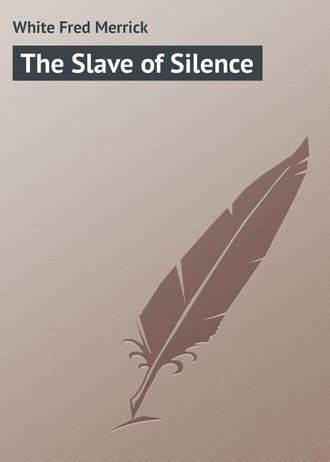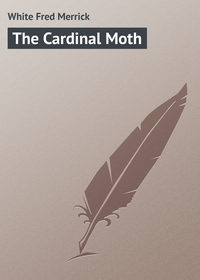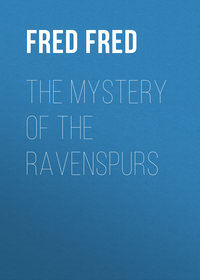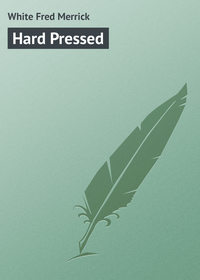 полная версия
полная версияThe Slave of Silence
The girl muttered something soothing and sympathetic; at the same time she rose and crossed to the bell. But Sartoris merely reached out a hand and asked her to help him into his chair. He sank back into the wheeled contrivance at length with a sigh that might have been pain.
"I'll go as far as the door with you," he said. "No, I can move myself along. And I hope that you will come here again; I'll let you know when it is quite convenient. Don't forget that I may be the indirect means of bringing you a fortune. I am a very old gentleman, my dear; won't you give me a kiss? Are you very much offended?"
The girl laughed and blushed as she bent down and touched Sartoris's cheek with her lips. A moment later they were gone, and Field had emerged from his hiding-place. He had discovered all that he required, for the present, and he decided not to take any further risks. The confused pieces of the puzzle were beginning to fit together in his mind, but they were by no means complete yet. Without further adventure the inspector crept back to the pantry and found himself at length in the road. He looked at the upstairs window whence the flickering signals had come, but it was all dark and still now, though it was not as yet late.
"So far, so good," Field muttered to himself. "It strikes me that that young lady is likely to be of service to me. I'll find out who she is and whence she comes. And now to go off to the Comedy and see if I can get in touch with the little actress who must play her part in more dramas than one. I wonder if I had better see her at the theatre or follow her to her rooms. I'll be guided by circumstances."
It was not more than half-past ten when Field reached the theatre. It was a popular house for the moment, where the management was running a kind of triple bill, consisting of one-act musical comedies, each of which contained the particular star artist. Two of the shows were already over, and the curtain was about to rise on the third, when Field reached the stage door. The inquiry for Miss Adela Vane was met by a surly request to know what was wanted. If the inquirer thought that he was going into the theatre he was jolly well mistaken.
"So you just be off, or I'll call the police," the crusty doorkeeper said. "One way or another, I'm pestered out of my life by you chaps. Oh, you can leave a message or a bouquet or something of that kind, but it's long odds it's shoved into the dusthole."
Field smiled as he produced his card and handed it over. The effect of the little square of shining pasteboard was marked and instantaneous. The man behind the bar was at once cringing and ready to do anything.
"I'm sure I beg your pardon, sir," he said, "but we are pestered out of our lives from morning till night. I dare say I can get you a few words with Miss Vane, who does not come on the stage till the third piece. And from the bottom of my heart, I hope that there is nothing wrong, for a nicer young lady than Miss Vane – "
"There is nothing wrong at all," Field hastened to say. "On the whole I've changed my mind. Don't say a word to Miss Vane about me, it may alarm her. Give me a programme; I'll just slip into the house and see Miss Vane from the stalls. Thank you."
Field made his way round to the front of the house, and presenting his card at the box office, desired to have a seat for half an hour or so.
CHAPTER XX
The immaculately dressed young man in the office turned Field's card over doubtfully. He had every desire to oblige, he said, but really the house was packed to its utmost capacity. Also the well-dressed young man hoped that there would be nothing to disturb the harmony of the proceedings.
"You may make your mind quite easy on that score," said Field with a reassuring smile. "There will be no disturbance as far as I am concerned. I want to identify somebody whom I believe is in the house, and when that is done my work is finished. Never mind about a seat – let me stand by the side of the stalls so that I can pass for an official."
There was no difficulty whatever about this, and therefore Field stepped into the house as the curtain was going up on the last of the brilliant trifles of the evening. The house was packed to its utmost capacity with an audience that seemed decidedly to appreciate the bill of fare that had been prepared for their delectation.
Field glanced round the house with his usual blank way that nevertheless took in everything. Most of the people in the stalls were known by sight to him. In an upper box on the prompt side he saw the dark face and eager eyes of the Rajah of Ahbad. He seemed to be looking for somebody, for his glasses were constantly in use. There was a restless air, too, about the Rajah, that showed that he was not altogether at his ease.
"We live and learn," Field told himself. "I wonder what yonder wily oriental would think if he knew all that I have discovered lately. I suppose one of his favourite ballet girls is in the piece. Pretty piece, too, and pretty music."
Field laid himself out for enjoyment for the next quarter of an hour. The heroine of the piece in the form of Miss Adela Vane was late in appearing. The thing was dragging, too, or so it seemed to Field. All at once there were voices at the back of the stage as if somebody was quarrelling. Suddenly the bright tuneful chorus broke off altogether and a female voice screamed. A little puff of smoke came from the stage.
In the twinkling of an eye the whole house rose and shuddered. There was a sharp crack-crackle, followed by smoke, and forked tongues of flame licked the imitation forest, and with a swish all the chorus fled from the stage. Far away up in the gallery somebody was roaring "Fire!" A rush to the doors was already taking place.
From the stalls rose a tall man with a military air, who commanded everybody to wait. There was no danger, he cried, if the audience only kept their heads. On the stage a manager, with a white face and a perspiring forehead, announced the fact that the appliances for dealing with the fire were of the finest possible description, and that there was no danger at all.
But it was all too late. The panic had already gripped the audience, and a yelling, frightened crowd pressed to the exits. The smoke was getting thicker and blacker; the flames were making the place unpleasantly warm. Field could feel the heat on his face. He had been close to the stalls exit, and might have slipped away at once, but he had held his ground. It was he who stood with his back to the door now.
"I'll knock down the first man who tries to pass me," he cried. "There is plenty of time. For God's sake, control yourselves. Come quietly. Don't you know that the whole theatre can be emptied in three minutes if people will only go quietly? Now come along and don't press." The stern, hard tones were not without their effect. Field looked so calm and collected and confident himself, that the feeling spread quickly all over the stalls. The fireproof curtain had not been dropped for the simple reason that it would not work, as is often the case with appliances of the kind. The stage was burning furiously.
But in the pit and dress circles and in the higher parts of the house other cool and collected men had risen to the occasion. Women were crying and sobbing, and more than one had fainted, but the mad panic was over, and something like order had been restored. The stalls were moving quietly along now, and it was marvellous to see how quickly the place was being deserted. In the vestibule a long queue of police had gathered and stood to prevent people huddling together. In less time than it takes to tell, everybody was outside. Like magic an engine had appeared, and men in helmets were jumping nimbly over the stalls laying their hose down. As Field turned to go a little cry from the stage attracted his attention.
A girl stood there, dressed as a Watteau shepherdess. She seemed absolutely dazed and frightened, a pretty and pathetic little figure in her great golden wig.
"Go back," Field yelled. "You'll have that blazing scenery on top of you. Why don't you go back to the stage door?"
The actress turned at last and shook her head. Tears were rolling down her face.
"I can't," she said. "The fire is too great. I was in my dressing-room, and I did not know. Oh, why doesn't somebody save me?"
It was quite clear that the little girl was too dazed and frightened to do anything. Without any further loss of time Field jumped into the orchestra and scrambled onto the stage. The hot flames drove him back for the moment; he could see already that the wig of the pretty little shepherdess was being scorched by the hot fiery breath. He lifted the girl in his arms and made a bold leap over the orchestra into the stalls. Then he carried her out into the street and called for a cab. The air of the night was not without effect on the frightened actress.
"Where shall I tell the man to drive?" Field asked.
"I shall remember presently," the girl said. "I am altogether dazed and stupid for the moment. I can see nothing but fire and smoke. Let me think. Oh, yes, it is coming back to me. Yes, Mrs. Marsh, 124, Copeland Avenue, Regent's Park. Oh, it is very good and kind of you. Will you let me tender my thanks when I am better?"
"I have done nothing," Field said modestly. A sudden idea occurred to him, accustomed as he was to think matters out quickly and in all kinds of startling surroundings. "If I may, I will call upon you to-morrow morning. Good-night."
The cab was whirled away, and Field went thoughtfully down the Strand. It seemed to him that he had seen the pretty little actress before, but then such queer sensations are frequent in times of danger and excitement, Field reflected. At the same time he could not quite rid himself of the idea that he had seen the girl before. He pondered over the matter until another idea filled his mind.
"By Jove," he exclaimed, "I had quite forgotten the Colonel's message. I was to go to Edward Street near the Borough and wait to see what I should see. I'll just go and hang about there for half an hour or so on the off chance, though I am as tired as a dog already. It seems to me that I can't do better than take a cab."
A cab accordingly whirled Inspector Field to the upper end of Edward Street, which is by no means a bad type of street for the Borough. The houses are of a respectable class for the most part, the class of houses that let lodgings to medical students and the like. It is not the sort of thoroughfare that is generally given over to adventures, and Field loitered about there for a long time before his search was rewarded.
He was chatting to a policeman on the beat, seeing that he could not loaf there without arousing the suspicions of the intelligent officer on duty, without disclosing his identity, when a couple passed him. The man wore a long fawn overcoat and a silk hat; he was a well-dressed man, as Field could see by his smartly cut trousers and patent leather boots. He was not alone, for he had a lady with him, a lady with a handsome wrap. There was a genuine West End air about these people that did not tally at all with Edward Street, as Field did not fail to notice. People of that stamp generally had a cab when there was any outing to be done at that time of night.
"Pull those people up and ask them some question," Field whispered to the officer. "I want to get a good look at their faces."
The matter was managed quite easily, though the man in the fawn coat was short and inclined to be curt in his replies. But it sufficed for Field, who expressed no astonishment as he recognized the features of the man called "Reggie," and the woman called "Cora," whom he had seen the night before at No. 100, Audley Place. In other words, he was once more hot upon the scent of Countess de la Moray and General Gastang.
"Very good, indeed, Watson," he said. "That's a bit of luck I hardly expected. I'll just follow these people and make certain. Good night."
Field had not far to go, seeing that the man in the fawn coat produced a latchkey and let himself into a house a little farther down the road. The house was an ordinary looking one enough, with plain green venetian blinds and muslin curtains below. In the drawing-room window there was a card to the effect that lodgings were to be let there. It was pretty late still, but a light in the basement testified to the fact that the housekeeper, or landlady, or whoever she was, had not yet gone to bed.
"It's late, but I'll try it," Field said to himself. "So here goes."
The inspector walked up the steps and rang the bell. After a little time a tall slatternly woman came to the door and looked sleepily out. She seemed by no means pleased to be disturbed, and the way she wiped her mouth with the back of her hand suggested the fact that she had been taking some of a pleasing and not altogether unintoxicating fluid with her supper.
"And what may you want at this time of night?" she asked suspiciously.
"Lodgings," Field said promptly. "I've just come to London, and I find the hotels so expensive. I'm prepared to pay an advance – a matter of five and twenty shillings a week or a little more, as it's only for so short a time. You see I am at the hospital."
"Well, if you are at the hospital you'd better stay there," the woman said with a laugh. "We don't let lodgings at this time of night, and besides, I settled with a party to-day. I'm not going to stand gossiping here all night. Be off with you."
The door closed, but not before Field had got a glimpse of the inside. The house was most beautifully furnished, as he could see. There was an atmosphere of hothouse flowers and fruit, and the like; a suggestion of exquisite cigars. A man in evening dress, with a diamond flashing in his shirt, crossed the hall; somebody was laughing in a well-bred voice. All of this Field did not omit to note as the door closed on him.
"That card about lodgings is a blind," he said. "That place must be watched. I'll get to bed, for I'm dead tired. In the morning I'll go and see my actress friend. Probably she can tell me all about Miss Adela Vane."
It was a little after eleven the next day before Field found time to visit the little actress. He had stupidly forgotten to ask her name, but he seemed to be expected. He waited for some time in a small prettily furnished room till the lady of the last night's adventure came down. She arrived presently, bright and pretty and smiling, her hand outstretched – words of gratitude on her lips.
"But I shall never be able to thank you properly," she said. "The public came very near last night to losing their dear, dear Adela Vane."
"You are Adela Vane?" Field gasped. "Really you are Adela Vane?"
For Adela Vane was the girl who had been closeted the night before with Carl Sartoris!
CHAPTER XXI
To go back for a space to Berrington. Heedless of his promise, he had burst headlong into the dining-room whence the cry came. He had forgotten altogether about Field. The fact half crossed his mind that nobody knew of the presence of the inspector in the house, so that anyway the latter's personal safety was not jeopardized.
It had been a foolish thing to do, as Berrington realised almost as soon as his mind cleared. He had been somewhat badly mauled in the preliminaries, and now it seemed to him that he was a prisoner in the hands of these people. The only consolation that was left to him was the fact that Field would come to his rescue in good time.
But Berrington was by no means done for yet. To begin with, there was not the slightest trace of fear in his heart. He had been in too many tight places before to have any emotion of that kind. He fell back against the wall, panting for breath; he looked around him again for some avenue of escape, but he could see none.
It was a curious scene, altogether, the elegantly furnished room, the litter of glasses and china and crystal in one corner, the mysterious outlined figure on the table. The glare of electric lights shone on the faces of the men there, on the impudent features of the woman who had posed as the Countess de la Moray, and on the pale, supplicating face of Mary Sartoris. For a little time nobody said anything.
It was Mary Sartoris who was the first to speak. She crossed over to her brother and held out her hand with a gesture of passionate supplication.
"It is all a mistake," she cried. "Colonel Berrington is under a misapprehension. He imagines that something wrong is taking place here; he has acted on the spur of the moment. He did not come to the house to see anybody but me."
Sartoris grinned in evil fashion. Just for the moment he looked half convinced.
"He comes in strange fashion," he said. "All the same, I have not the least doubt of the value of Colonel Berrington's friendship so far as you are concerned. But that is not the point. Did you admit your friend Colonel Berrington to the house?"
For the fraction of a second a bold lie trembled on Mary's lips. But she could not utter it. She looked down in confusion, and her face trembled. Sartoris grinned in the same wicked fashion. A black rage was rising in his heart.
"Good girl," he sneered. "Always tell the truth. It is the proper thing to do, and it will bring its own reward in the end. Only it is attended with personal inconvenience at times, such as the present, for instance. How did Colonel Berrington get here?"
"I will save your sister the trouble of replying," Berrington cried. "I came here, acting on certain information that had come to my knowledge. I came here to discover if I could learn some facts bearing on the disappearance of Sir Charles Darryll's body. And I am not disposed to think that my efforts are altogether in vain."
It was a bold speech and not without its effect. The woman called Cora turned a shade paler, and the clean-shaven man by her side winced. The only one who seemed disposed to a mild course of policy was Bentwood.
"For heaven's sake don't let us have any violence," he said hoarsely. "There has been too much of that already. I mean there is no necessity for anything of the kind. If Colonel Berrington knows anything of any of us – "
"I know everything," Berrington replied. It seemed to him that a bold course of action was the best to be taken under the circumstances. "For instance, I have a pretty accurate knowledge of the checkered past of Dr. Bentwood and the malignant scoundrel who calls himself Carl Sartoris. Of Miss Mary Sartoris I will say nothing. There are others here, too, whose past is not altogether wrapped in mystery. There are General Gastang and Countess de la Moray, for instance. And once I am outside these walls – "
Sartoris pushed his chair close to the speaker. He was seething with passionate rage, his face was livid with anger. For the moment he could do nothing; he only thirsted for the blood of the bold Berrington.
"You are not outside these walls," he said. "You are not likely to be outside these walls for some time to come. You have described us in language that you have spared no trouble to render abusive. You know too much. And we have our own way here of dealing with enemies of ours who know too much."
There was no mistaking the dreadful threat that underlay the hoarse speech. There was underground murder in the eyes of Sartoris. Berrington smiled scornfully.
"I know exactly what you mean," he said; "indeed, I know more than you give me credit for. And I will make my suspicions certainties."
Berrington advanced swiftly to the table and laid a hand on the sheet that covered the still, silent form there. Another instant, and the whole mystery would have been exposed. But Sartoris propelled his chair forward and grabbed Berrington by the arm.
"You cowards," he yelled. "If I were not cursed by these crippled bones of mine, I would have plucked that fellow's heart from his body. Don't stand there like a lot of mummies. Pull him back, I say, pull him back."
The harsh, ringing command seemed to restore the other listeners to a sense of what they owed to themselves. With a cry, the man called Reggie was on Berrington, though Mary Sartoris had fallen and clasped him around the knees. With an oath, Bentwood darted forward and flung himself upon Berrington's shoulders. The struggle was a hot one, for the Colonel fought well, but the odds were too many for him, and he was borne at length heavily to the ground. His head came in contact with the floor, and he lay there just a minute dazed and giddy.
He had failed, too, which was the most humiliating part of the business. He had, at any cost, resolved to make assurance doubly sure. He could see the grinning triumph on the face of Sartoris, as he scrambled to his feet; he could see the tears in Mary's eyes. For the personal danger to himself he cared nothing.
"Let's make an end of it," Sartoris cried. "He's too dangerous to live. Let us make an end of him. Dead men tell no tales."
"No, no," Mary cried. "You shall not do it. No, no."
"Then go and fetch the police," Sartoris said with a little laugh. "Fetch them in, I say. Let them come here and investigate, and after that you can stand in the dock and give evidence against your own brother. My child, you are free to depart as soon as you like. Go now!"
Mary Sartoris stood there trembling and hesitating. Sartoris wheeled his chair rapidly and dexterously across to her, and then raised his fist in a threatening manner. For a moment it seemed as if he meant to strike the girl.
"Go now!" He repeated his command harshly. "Go at once! Go out of my house and never come back again, you white-faced mewling cat. Pah, you dare not do anything. You are not to stay in the room. Go!"
The girl seemed dazed and unable to exercise her own will. She crept with faltering steps to the door. As she was going out, she turned an eye of affection on Berrington.
"If you will only promise me that there will be no violence," she said, "I – "
"I promise that," Bentwood said in a cringing voice. He was the only man there who seemed to be restless and uneasy and anxious. "There is going to be no violence so long as I am here. Why should there be any violence at all?"
The man asked the question with an eye on Berrington. For some reason or other he seemed very desirous of pleasing the soldier, and yet not offending his comrades. Sartoris laughed.
"Cautious man," he said. "Always be on the safe side. Hang the girl, is she going to stay here all night? Go, I tell you; take your white face from me. Go."
The door closed behind Mary Sartoris, and something like a sob came from the hall. With a sudden fury and new strength Berrington darted to the table again. Once more he might have been successful, but the keen eye of Sartoris was upon him; the cripple seemed to read his thoughts. Like a flash the invalid chair caught Berrington on the shin, and sent him sprawling across the floor; the chair sped on and there was a sudden click and the room was in darkness. Berrington had a quick mental picture of where different objects were – and he made a dash for the switch. Some great force seemed to grip him by the hands, he was powerless to move; he heard what seemed to him to be the swing and jolt of machinery. Somebody was laughing much as if a funny play was being performed before delighted eyes, with Berrington for the third man of the company, and then the light came up again.
Angry and baffled and disappointed as Berrington was, all these feelings gave way to amazement as he looked around the room. Every sign of a body had disappeared, the room was empty save for Sartoris, who sat smoking a cigarette, with a sardonic smile on his face. All the others had gone, and the body was gone from the table; on the latter was a dark crimson cloth surmounted by a mass of flowers arranged tastefully around an electric stand. Sartoris laughed in an easy, mocking way.
"Miracles whilst you wait," he said. "I just press a button and there you are. You say that you saw a lot of people here and some object on the table. You would swear to that?"
"Being in full possession of my faculties, I would," Berrington said grimly.
"And where are they? There was no lady, there were no people, only my humble, sweet self always glad to see my distinguished friend Colonel Berrington."
Berrington made no reply for a moment. It seemed hopeless to try to cope with the little fiend who appeared to have all the powers of hell behind him. He looked down at the floor as if to find evidence of magic there, but the pattern of the turkey carpet was intact, the big brass-headed nails were in the corners and along the fireplace.






